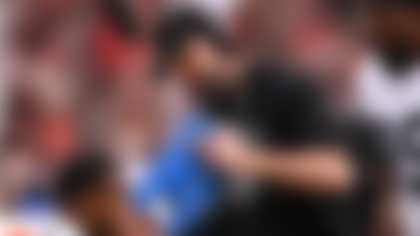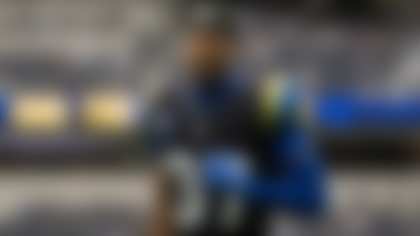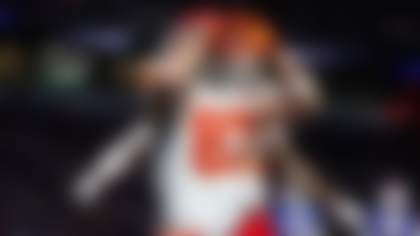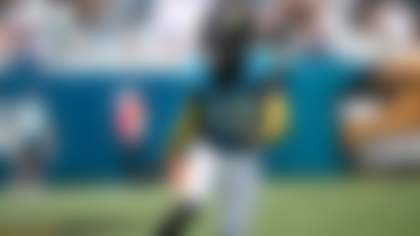The season hasn't even started, and NFL officials already have generated the wrong kind of headlines.
Last month, there was a surprising and, some might say bizarre, public apology for bad calls made in Super Bowl XL, which was played in 2006.
In the past several weeks, an adjustment to the positioning of the umpire resulted in sharp criticism from the league's most prominent player, Peyton Manning, which prompted even more adjusting and tweaking ... and won't likely prevent further second-guessing.
Continued advancements in high-definition technology allow television viewers to see what should or shouldn't be called as well as, if not better than, the people paid to make those decisions in a split second.
And if that weren't enough, the league's former head of officiating, Mike Pereira, will be standing by to instantly chime in during Fox Sports' game coverage to let viewers know when and why an officiating crew got it right ... or wrong.
With apologizes to Willie Nelson, "Mama, don't let your babies grow up to be NFL officials ..."
Scrutiny has always been a given in the job, but it seems to have reached new heights.
Officials, like the participants in the games they officiate, make mistakes. However, the tolerance for those errors seems to have diminished greatly as the stakes for winning and losing have climbed to unprecedented levels. Owners worry about filling seats and suites, and selling sponsorships. Coaches, as well as players, worry about preserving multi-million-dollar careers. Fans worry about winning their fantasy leagues.
One way or another all of that can be impacted by the tossing of a single yellow flag, or any number of other rulings and non-rulings by the guys in the zebra stripes.
That presumably was what Bill Leavy, an official who worked Super Bowl XL, had in mind when he told reporters during an August visit to Seattle's training camp that he botched two fourth-quarter calls and that he "impacted" the Seahawks' 21-10 loss to the Pittsburgh Steelers. Quarterback Matt Hasselbeck took Leavy's admission in stride.
"It's a game," Hasselbeck said. "It's not a perfect science."
Perhaps not. But those who practice it can count on an endless supply of opinions about their work.
"It's a tougher job," said Pereira, former vice president of officiating for the NFL. "And you're also held more accountable than you were 20 years ago."
Until his retirement earlier this year, Pereira was in charge of establishing the accountability standard to which the league's officials were held. Now, he's going to be network television's first NFL officiating analyst, a job he begins Sunday for Fox Sports.
Pereira, who will also be writing for Foxsports.com, might not have a direct say in an official's future. However, his opinion figures to carry far more weight than that of an announcer or any other observer. On Sundays, he will be positioned in a studio where he will watch all of the games on a bank of monitors, similar to what he did when he worked for the league. Only now, instead of being in constant communication with NFL personnel at various game sites and putting together written evaluations of each official's performance, Pereira will, when Fox producers deem appropriate, be immediately brought into the coverage of one of its games via camera or audio.
"I'm an analyst," said Pereira. "Just like any analyst, whether it's an ex-coach or an ex-player, would give their opinion, that's what I'm going to do. I'm going to give my opinion on decisions that are made based on my experience and my knowledge. If, in fact, I end up saying that the decision is incorrect or the call is incorrect, so be it. (The officials) are big boys. They understand.
"In the long run, it'll educate fans and educate announcers and it will be better for officiating because people will have a better understanding for why they're making their decisions and how they're making their decisions. The NFL fans, the true fans of the game, want to know if something is right or wrong, correct or incorrect. I think they deserve to know it, and that's all part of the teaching process."
Let the critiquing commence.
Still a major flaw that Pereira sees in the mechanics involved with the umpire's new spot is asking the head linesman or line judge to signal the quarterback when the umpire is even with the deepest offensive player and, therefore, a snap is legal.
"I still don't agree with the line-of-scrimmage guy signaling that the umpire is clear, because I think you're forcing the quarterback to do something that he's not inclined to do," Pereira said. "He goes to the line of scrimmage and looks at the defense; he doesn't look at the sideline. I still think that's going to create some problems."
With the head linesman and line judge already responsible for watching for neutral-zone infractions and illegal formations, among other violations, Pereira said it "doesn't make sense" to add to his load. He also objects to having the umpire return to his old position, on the defensive side, inside five minutes of the fourth quarter (he's also going to move there after the two-minute warning of the second quarter).
"How can you say you're doing this for safety reasons and now you're finding all these reasons to put him back (to the potentially more dangerous spot) for longer periods of time?" Pereira said.
Spoken like so many others who have something to say about all aspects of NFL officiating.



